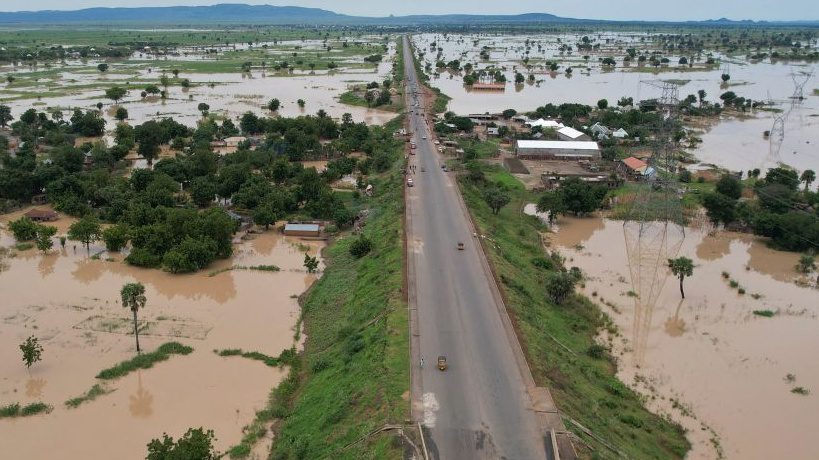New world order?
by Kate Mackenzie and Tim Sahay in Phenomenal World….At The Polycrisis we have been tracking the whipsaw of the global financial system amid private finance mantras, interest-rate hikes at the Fed, and the explosion of debt in the global South.
Climate crisis → drought → food deficit → migration
by Mohan Mainali in Nepali Times….Half-century of eastern Nepal’s rainfall data points to a link between chronic drought and depopulation
Resilience revisited 02. Dissonance as conscience: navigating the path between ecological integrity and everyday life
by Tamzin Ractcliffe on Linked In…As we navigate the complexities of living sustainably in an often unsustainable world, embracing our dissonance—not as a source of guilt but as a catalyst for change—can empower us. It’s a call to action that reminds us of the urgency of our collective efforts toward ecological integrity.
Tenth consecutive monthly heat record alarms and confounds climate scientists
by Johathan Watts in The Guardian…If the anomaly does not stabilise by August, ‘the world will be in uncharted territory’, says climate expert
The futures triangle
from Insight & Foresight….The Futures Triangle is a tool that can help you map the gap between vision and performance and start the process of using foresight to support your planning and decisions making for impact and future growth.
The eco-civilization framework
by Jeremy Lent in Resilience.org…Whether we can reweave the strands of our unraveling civilization into a flourishing future will only be known on the other side of the turmoil that lies ahead this century. But as each climate disaster brings our current system closer to collapse, we have an overriding obligation to future generations, and to life itself, to shine a directional beacon through the darkness of our times to a potentially brighter future—and to help lay down a trail toward it.
Dancing with a permanent emergency
by Jonathan Rowson in The Joyous Struggle….The climate crisis is still there, and it is a moral imperative to address it and it matters perhaps more than any other single issue matters. And yet, because we are so profoundly stuck, I think our best chance, perhaps our only chance, is to see the climate challenge through the prism of the metacrisis, with all that follows for educational and spiritual innovation, which is why that has become my professional focus. Once we realise that there is no way to act on climate change with the requisite skill, insight, legitimacy, and resolve without contending with the metacrisis, our sense of priority should change. There is, as they say, no way round but through.
The European Union’s economic security strategy update
By Emily Benson in CSIS….As partners advance to this new era of technology-driven economic security agendas, governments will need to work concertedly to break the long-standing barriers between trade policy and national security.

Led by Its Youth, U.S. Sinks in World Happiness Report
For the first time since the first World Happiness Report was issued in 2012, the United States was not ranked among the world’s Top 20 happiest countries. The drop was driven by people under 30. The New York Times Read full article in The New York...
The Eco-Civilization Framework
As the planet burns, authoritarian populists dominate politics, oil executives direct the COP process, and the wealthy elite pull further away from everyone else, it is difficult not to draw the conclusion that the movement for a beneficial future...

A starting point for degrowth: The Costa Rica “Pura Vida” meaning
By Juan Ignacio Marín Degrowth is a theory, a movement, and a practice with a long and distinguished history. The excellent Wikipedia article (worth consulting) starts this way: Degrowth or post-growth economics is an academic and social movement...
“Lean Weaving”: Creating networks for a future of resilience and regeneration
by Curtis Ogden in the International Institute for Social Change….“The more flexible the sub-systems, the longer the expected life of the system as a whole.”
Chartbook 268: “How can we not know?”: CAR and the challenge of tracking a silent crisis.
By Adam Tooze in Chartbook 268…It was at a moment when many of us were discussing the polycrisis as a concept with which to grasp the current world. Was an explosion of child deaths the ultimate indicator of crisis?
History’s crisis detectives: How we’re using maths and data to reveal why societies collapse – and clues about the future
by Daniel Hoyer in The Conversation….Our goal is to find out what drove these societies into crisis, and then what factors seem to have determined whether people could course-correct to stave off devastation.
Global energy-related CO2 emissions hit record high in 2023 – IEA
by Reuters in Climate Home News…Global emissions from energy rose by 410 million tonnes, or 1.1%, in 2023 to 37.4 billion tonnes, hitting a record hight
Crop insurance costs explode
by Robert Arnason in The Western Producer…Those massive payments are connected to the severe drought of 2021, which crushed crop yields across much of Western Canada. There’s also the factor of higher prices for grains, oilseeds and pulse crops, which exacerbated the size of crop insurance payments.

